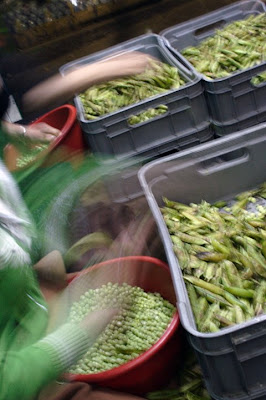After almost twenty years of waiting for her husband to return to Ythaca, Penelope was forced to agree to wed one of the many suitors that had occupied her palace, and promised to make a decision once she had finished weaving a shroud for Laertes. Weaving during the day, she stayed up tearing it up at night to delay the moment, but was discovered and just about to make the choice when Odysseus finally turned up, killing or chasing away the suitors...
This is exactly how I felt about the women who work from very early morning until dawn at the Bay 30; there they were sitting, some with their baby sleeping in the push-chair on their side whereas shucking off the endless peas and selecting the best quality ones to be packed and classified. The rhythm and speed by which they took off the peas looked like they were playing a music instrument.
I thought of those women working night by night sitting on the same crate taking the husk off peas; yesterday, the day before yesterday, tonight, tomorrow, the day after tomorrow... from 4:00 am to midday when they go back to their homes and feed their children and back to the Corabastos to start all over again...
























1.21.jpg)


1.19.jpg)



1.33.jpg)





